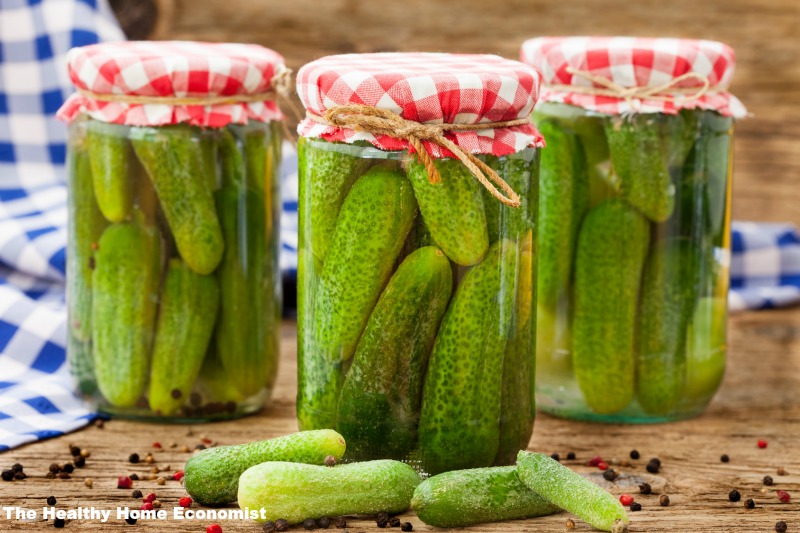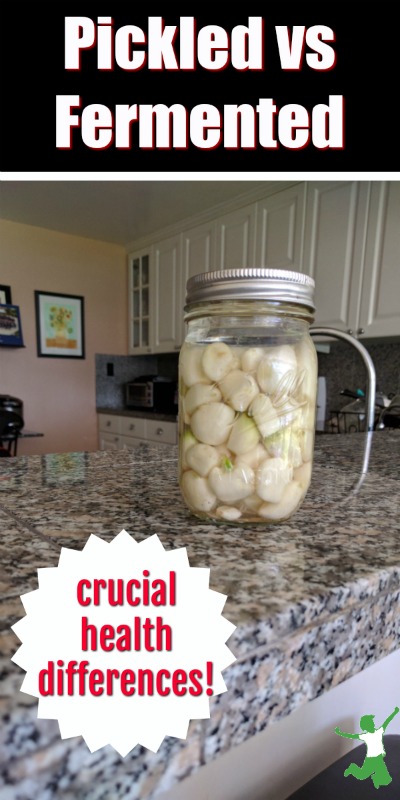The often overlooked differences between pickled and fermented foods. They are not necessarily the same nor do they offer the same benefits to health.
There seems to be a bit of confusion going around about fermented foods and the difference between what you make in your kitchen and the pickled versions that are available on the supermarket shelf. For example, in one of my video lessons, I demonstrate how to make sauerkraut in the traditional manner.
After the shredded cabbage ferments on the kitchen counter for a few days, it is then refrigerated or kept in a cool cellar where the sauerkraut remains naturally preserved for extended periods of time.
How does this homemade pickled cabbage compare to the pickled cabbage in a jar in the supermarket? What about pickled cucumbers or pickled garlic, also popular commercial choices?
Pickled vs Fermented Foods
Alex Lewin, author of Real Food Fermentation explains that the confusion comes from the overlap in definition. In a nutshell, not all fermented foods are pickled and not all pickles are fermented.
In other words, foods that are pickled are those that have been preserved in an acidic medium. In the case of various types of supermarket pickles on the shelf, the pickling comes from vinegar.
These vegetables, however, are not fermented (even though vinegar itself is the product of fermentation) and hence do not offer the probiotic and enzymatic value of homemade fermented vegetables.
Vegetables that you ferment in your kitchen using a starter, salt, and some filtered water create their own self-preserving, acidic liquid that is a by-product of the fermentation process. This lactic acid is incredibly beneficial to digestion when consumed along with the fermented vegetables or even when sipped alone as anyone on the GAPS Intro Diet has discovered (cabbage juice anyone?). In other words, homemade fermented veggies are both fermented and pickled.
Alcoholic Fermentation
What about alcoholic fermentation?
In the case of wine and unpasteurized beers, fermentation occurs as the result of certain yeasts converting sugars into alcohol but there is no pickling that takes place despite the common expression that a person who has had too much to drink is “pickled”.
4 Benefits of Culturing without Heat or Pressure
Home fermentation of vegetables preserves without the use of any pressure or heat unlike supermarket versions of the same foods. It allows the ubiquitous and beneficial lactobacilli present on the surface of all living things – yes, even your own skin – to proliferate creating lactic acid which not only pickles and preserves the vegetables, but also promotes the health of those that consume it in the following ways:
- Enhances the vitamin content of the food.
- Preserves and sometimes enhances the enzyme content of the food.
- Improves nutrient bio-availability in the body.
- Improves the digestibility of the food and even cooked foods that are consumed along with it!
Avoid Shelf Stable Pickled Foods
So don’t be fooled by unhealthy supermarket pickled versions of homemade fermented foods.
These modern foods are the product of high heat and pressure which destroys nutrients and does not in any way enhance health.
The one exception to this rule is the various fermented foods in the refrigerator section of many health food stores. These products are actually fermented and pickled. The only drawback is that these gourmet items are rather expensive compared to the pennies per ounce it costs to make them yourself.
If home fermentation is a kitchen goal that you are ready to tackle, there are plenty of fermented foods recipes on this blog to help get you started on this fun journey! If you prefer trying fermented beverages first, the provided link will take you to over two dozen recipes to consider.









Thank you so much for this post. I have been wondering about the jars at the store and have not ventured into doing my own “fermenting” yet.
I purchased (expensive) barrel sauerkraut from my local health food store. The brand name is GUNDELSHEIM. I went to their web site to find out if this is “real’, straight up fermented kraut. Could find no information. If it says all natural, no preservatives, just cabbage and salt, and is in the refrigerated section, is that enough to ease my mind that I am getting the benefits of fermentation? I would hate to think that I am spending money on a dead product. Thanks
So, is the fermentation that takes place to make wine at all beneficial? How does it compare to fermented foods?
re: thyroid patients and cabbage: I was thinking of doing the GAPS diet in order to help my hypthyroid condition, but did have a concern about using fermented cabbage. Does anyone know if kombucha tea can be substituted for the fermented saurkraut liquid in this diet or any other solutions to this dilemma? Any thoughts or ideas would be appreciated. Thanks!
Another question I have is, does fermented garlic have the same “antibacterial” benefits as raw. We have raw garlic every day during flu season to ward off the bug but I’m curious about the benefits of fermented.
the store ones are not pickled. they are flavored veggies. what you make in a jar or crock for days or even weeks IS pickles. that’s why these 4 crocks I have are CALLED pickling crocks!
perfect
I’ve been making dill pickles with whey, salt and filtered water. They are to die for, however, they turn to mush. I mix with raw onion for a hamburger, but does anyone know what I’m doing wrong?
try a starter culture like Caldwells. This helps jump start the fermentation in the same way that whey does, however it is formulated in a way that certain bacteria do not crowd out (and thus consume and make mushy) your cucumbers before others do.
You need to add several grape leaves to the crock. The tannins will keep them crisp. You can also use black tea leaves, horse radish leaves or oak leaves from an oak tree. Clean them well and cut the stems off make a pile of them as your first part of layering the crock.
Our family had a great time this fall making sauerkraut all you need is cabbage water and sea salt! and watch it ferment!! We could not believe how easy it was to make and how nutritious it is for you! I found out the sailors kept barrels of sauerkraut to keep from getting scurvy.